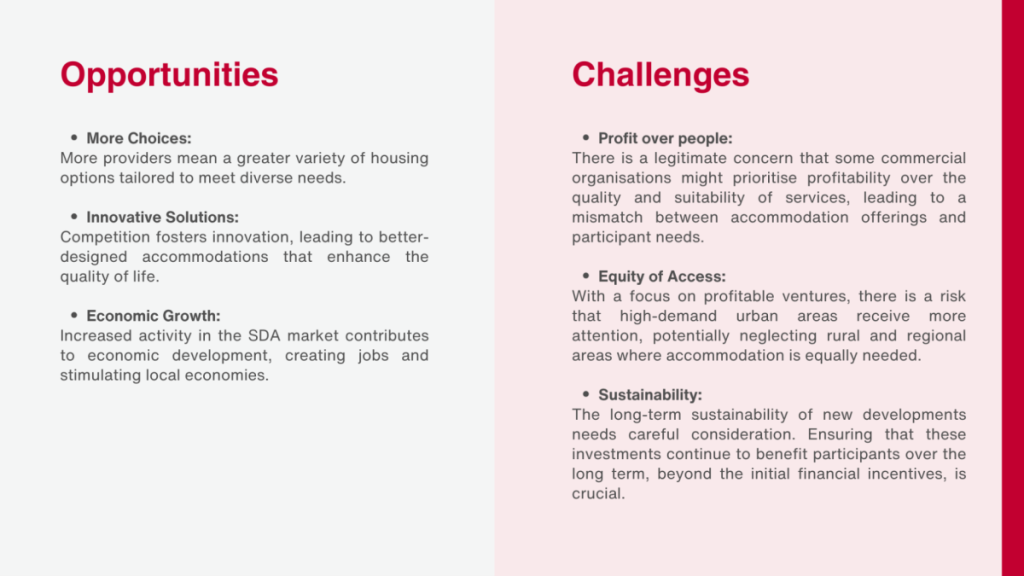The Impact of Commercial Organisations in Victoria’s Specialist Disability Accommodation Market
The Specialist Disability Accommodation (SDA) market, integral to Australia’s National Disability Insurance Scheme (NDIS), has witnessed significant transformation, particularly in Victoria. As commercial organisations increasingly enter this space, it is crucial to be aware of their impact on the market dynamics, quality of services, and the lived experiences of people with disabilities.
Increased Investment and Development
The influx of commercial organisations into the SDA market has led to a noticeable surge in investment. This heightened financial interest has catalysed the development of new and modern accommodation facilities across Victoria. These developments are often defined by enhanced accessibility features, innovative designs, and a focus on creating supportive living environments. For participants, this translates to more options and improved living conditions.
Opportunities:
- More Choices: More providers mean a greater variety of housing options tailored to meet diverse needs.
- Innovative Solutions: Competition fosters innovation, leading to better-designed accommodations that enhance the quality of life.
- Economic Growth: Increased activity in the SDA market contributes to economic development, creating jobs and stimulating local economies.
Challenges:
- Profit over people: There is a legitimate concern that some commercial organisations might prioritise profitability over the quality and suitability of services, leading to a mismatch between accommodation offerings and participant needs.
- Equity of Access: With a focus on profitable ventures, there is a risk that high-demand urban areas receive more attention, potentially neglecting rural and regional areas where accommodation is equally needed.
- Sustainability: The long-term sustainability of new developments needs careful consideration. Ensuring that these investments continue to benefit participants over the long term, beyond the initial financial incentives, is crucial.

Legislative Oversight
To mitigate these risks, stringent regulatory frameworks and vigilant oversight by the NDIS and relevant Victorian authorities are essential. These measures ensure that all SDA providers, commercial or otherwise, adhere to the high standards required for participant welfare.
Key Measures:
- Compliance and Quality Assurance: Regular audits and assessments help maintain service quality and ensure compliance with NDIS standards.
- Participant-Centered policies: Policies must continually evolve to prioritise the needs and preferences of participants, ensuring that their rights and choices remain at the forefront.
- Transparency and Accountability: Clear reporting and accountability mechanisms are vital in fostering trust and transparency in the market.
The Path Forward
The growing presence of commercial organisations in Victoria’s SDA market is a double-edged sword. On one hand, it brings much-needed investment and innovation, offering participants more choices and better living conditions. On the other hand, it necessitates robust regulatory frameworks to ensure that the primary focus remains on delivering high-quality, participant-centered housing.
For commercial organisations, the path forward involves balancing profitability with social responsibility! By actively engaging with participants, understanding their needs, and prioritising their well-being, these organisations can and are contributing positively to the SDA landscape.
As we move forward, a collaborative approach involving all stakeholders—participants, providers, regulators, and commercial entities—is essential! Together, we can build a sustainable, inclusive, and high-quality SDA market that truly serves the needs of people with disabilities in Victoria.
READ MORE